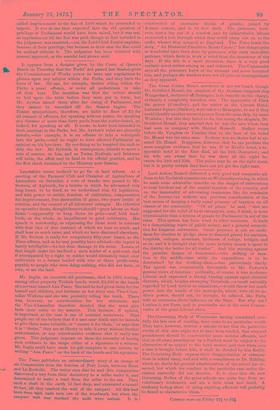Lord Arthur Russell delivered a very good and temperate ad-
dress to his Tavistock constituents on Wednesday evening, in which he made some admirable remarks on the danger of subventions to local burdens out of the central taxation of the country, and on the immorality of advocating remissions like the remission of the Income-tax without any previous consideration of the best means of keeping a fairly equal pressure of taxation on all classes of the community. " Of all plans," he said, " that are suggested for the relief of local ratepayers, none, I think, is more objectionable than a system of grants by Parliament in aid of the rates. This system has been tried in other countries. It leads to a demoralising waste of public money, and a general competi- tion for Imperial subvention. Great pressure is put on candi- dates for election to pledge them to demand grants for asylums, hospitals, colleges, museums, harbours of refuge, bridges, and so on, and it is thought that the more lavishly money is spent in the district the better for all trades." And his warning against the peculiar danger of democracy,—the shifting of taxa- tion to the middle-class while the expenditure is to be determined by the working-class,—was particularly timely. The speech was economically favourable to Mr. Fawcett's general views of taxation ; politically, of course, it was moderate Liberal, and expressed a strong leaning against equal electoral districts, which, besides swamping Tavistock,—a result naturally regarded by Lord Arthur as calamitous,—would throw too much power into the hands of the metropolis, which, with all its in- direct power, should not, he thought, be inflated, like Paris, with an enormous direct influence on the State. But why not? London is not Paris, and is practically one of the most Conser- vative of the great Liberal cities.


































 Previous page
Previous page